Introduction
Brazilian Jiu-Jitsu, commonly known as BJJ, is a popular martial art and combat sport that focuses on using leverage and proper technique to control and submit an opponent.
It rose to prominence through the Ultimate Fighting Championship (UFC) and Mixed Martial Arts (MMA).
When it comes to doing BJJ, staying hydrated by drinking enough water is extremely important. But how much water should I drink for BJJ? Let’s find out.
BJJ training sessions and competitions involve high-intensity grappling, takedowns, ground fighting and submission techniques like arm locks and chokes.
This leads to immense physical exertion and sweating. Dehydration during or after a BJJ class can lead to cramps, fatigue, dizziness and other problems. This affects performance in the session as well as recovery afterwards.
Drinking adequate water before, during and after BJJ is crucial. The standard guideline is to drink around 0.5 to 1 liter of water per hour of training.
However, the exact amount of water intake needed varies based on factors like body weight, climate and intensity of training.
Also read – Do Weighted Gloves Increase Speed? Debunking the Myth.
Recommended water intake for BJJ
During the BJJ class itself, you should be sipping water at regular intervals. Keep a water bottle handy and take small sips whenever there is a brief break or when the instructor is demonstrating techniques. Don’t gulp down large amounts of water at one go as that may cause cramps.
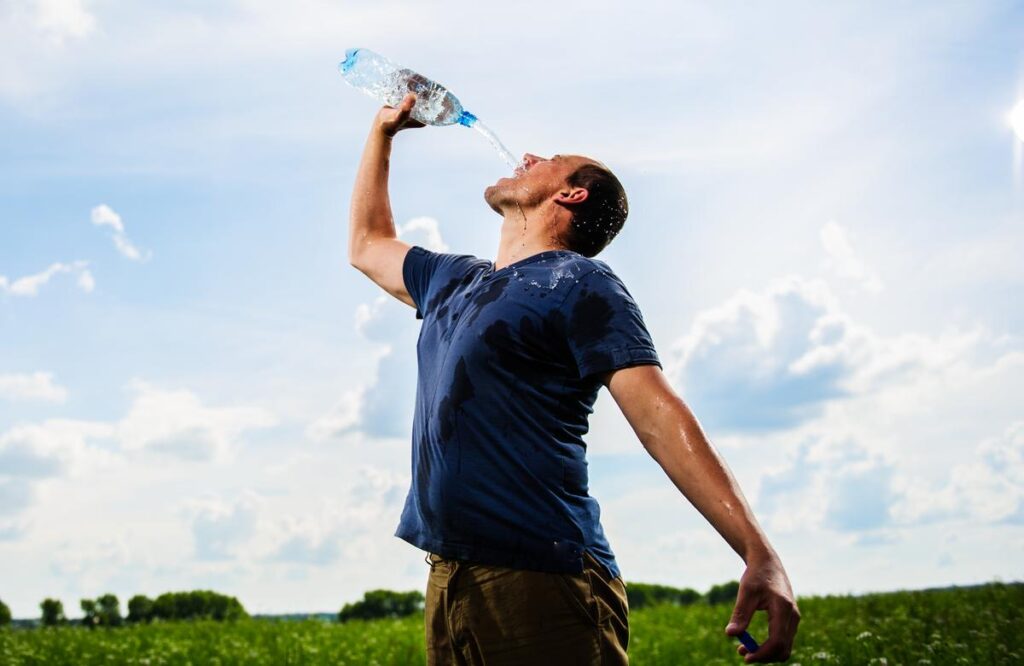
In the 1-2 hours before a BJJ session, drink around 16-32 oz (500 – 1000 ml) of water at spaced out intervals.
Post the session, drinking another 16-32 oz helps recover and rehydrate. Spread out the water intake pre and post workout, rather than drinking a large amount at one time.
Listen to your body’s signals. If you feel excessively thirsty or experience muscle cramps, drink more water.
Keep an eye out for signs of dehydration like dark urine, fatigue, dizziness etc. Staying on top of hydration is key for BJJ.
How to Calculate Your Sweat Rate
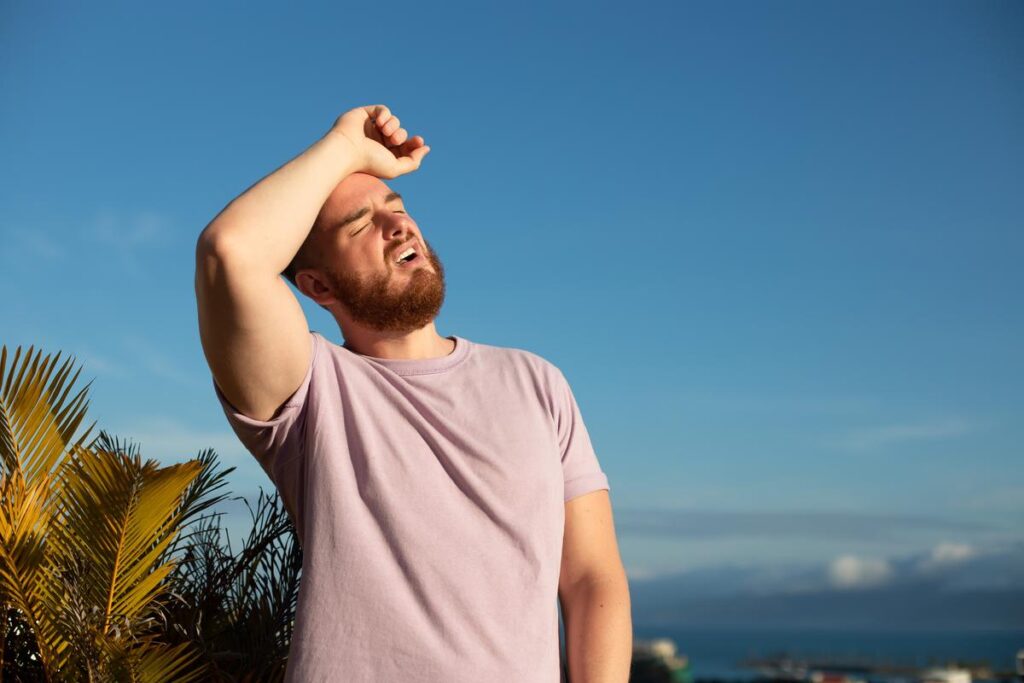
How much water should I drink BJJ?
Hydration for jiu-jitsu is serious biz. You gotta know your personal sweat rate and how much water to drink before, during, and after training. I’ll walk you through it step-by-step so you can crush your hydration game.
Calculating Your Sweat Rate
First up, figuring out your sweat rate in ounces per hour. Here’s how it works:
Weigh yourself naked before training and write it down. Train like you normally would in a gi or no-gi session. Keep track of how much water you drink during the session.
After training, strip down and weigh yourself again. Subtract your pre-training weight from your post-training weight. Now subtract the ounces of water you drank. Divide that number by the hours you trained.
Boom – that’s your approximate sweat rate.
Ideally, you wanna be in the range of about 20-40 oz per hour lost through sweat, depending on size and gender. If you’re way above or below that, you gotta tweak your hydration strategy.
Now you know your baseline sweat rate, you can dial in how much to drink before, during, and after training.
Don’t just rely on feeling thirsty – that kicks in when you’re already dehydrated. Gotta stay ahead of it.
Hydrating Before Training
You want your fluid reserves topped off before you hit the mats. For daily hydration, health experts recommend around 12 cups of water for women and 16 cups for men.
An old school trick is to check the color of your pee – if it’s light yellow you’re good, dark yellow means get drinking.
In the 24 hours before training, pound extra water so you’re going in hydrated. Avoid alcohol and caffeine the day before – they’ll dehydrate you and leave you drained.
Hydrating During Training
When it’s go time, sip about half your sweat rate consistently through your session. No need to slam water unnaturally. For a 2 hour class, sip 8-12 oz each 30 mins. Between rounds, swig even if you aren’t thirsty yet.
If you start getting wicked cotton mouth, headaches, or wicked muscle cramps, you need more H2O stat. Hydrate immediately to avoid disaster.
Post-Training Rehydration
Chugging water right after training can actually dilute your sodium levels and leave you even more dehydrated.
Have some electrolyte drinks or coconut water to replenish what you lost. Eating foods with sodium and potassium helps too.
Keep sipping water the rest of the day to fully rehydrate before going beast mode in your next class!
Factors that Impact Hydration Needs
When it comes to hydration for jiu-jitsu, there’s no one-size-fits-all answer.
The amount of water you need depends on climate, training intensity, sweat rate, and your body’s individual needs. I’ll break it down so you can crush your fluid goals.
Sweat Rate Matters
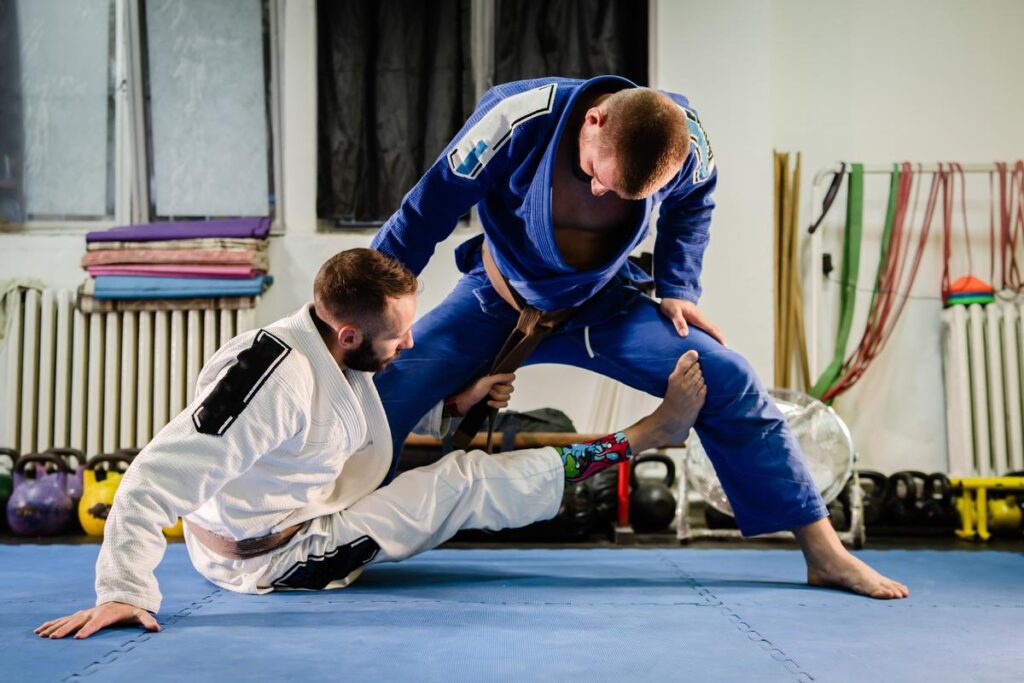
Figuring your sweat rate is step one. This is how much fluid (in oz) you lose per hour of training. Here’s how to calculate it:
Weigh yourself naked pre and post training. Track ounces of water/drinks you consume during the session.
Subtract your post-training weight from your starting weight. Now subtract the fluid you took in. Divide that number by training hours and bam – your approximate sweat rate.
Shoot for 20-40 oz per hour as a general guideline. But don’t obsess about a specific number – sweat rate varies day to day. Just check in now and then to make sure you’re in the ballpark.
Climate Changes Things
Training in a humid 90 degree gym in Miami? You’re gonna sweat more than rolling in a climate controlled gym in San Fran. In hot and muggy conditions you need to bump up fluid intake.
Aim for the higher end of your sweat rate range on humid days. Between rounds, pour water over your head and neck to cool down. Watch out for heat illness warning signs like headache, nausea, and wicked leg cramps.
Training Intensity Matters
Are you drilling technique nice and easy or going HAM in competition training? Light rolls need less hydration than battles where you’re pushed to exhaustion.
On intense days when you’re gassed and dripping sweat every round, you gotta be disciplined about sipping 8-12 oz every 30 mins to avoid gassing out. Err on the higher side of your fluid needs.
Listen to Your Body
Size, gender, genetics – we all hydrate differently. Smaller women lose less fluid than hulking dudes. No spazzing if your sweat rate is on the low end. Just listen to your body’s signals.
Stay vigilant for symptoms of dehydration like excessive thirst, headache, dark pee. Dry or sticky mouth means drink up quick. Fine tune your water intake over time for what works best for you.
Pre-Training Hydration
In the days before training, pound extra water to load up your reserves. Avoid booze and caffeine which dehydrate you. Antioxidant rich drinks like tart cherry juice boost hydration too.
Check your urine – you want it light yellow. Dark yellow pee means you need more fluids asap. Get hydrated well in advance of training.
Post Training Recovery
After training, electrolytes and potassium-rich foods replace what you lost through sweat. Keep sipping water – don’t chug a gallon right after. Gradually rehydrate in the hours after class.
Tune into your body’s signals and hydrate like a boss. Now get out there and crush it on the mats! Oss!
Hydration Guidelines
When it comes to jiu-jitsu performance, hydration is clutch. You can’t beat someone if you’re running on empty. Here’s how to dial in your fluid intake to dominate on the mats.
Daily Hydration Baseline
First, let’s cover basic daily hydration when you aren’t training. The standard rec is around 12 cups (96oz) of water for women and 16 cups (128oz) for men. Adjust for body size – bigger folks need more.
An easy way to test if you’re drinking enough is to check your pee. You want it to be pale yellow. If it’s as dark as apple juice, start guzzling more H2O immediately.
Fruits and veggies also count towards your fluid intake. Stuff like watermelon, cucumbers, and celery are mostly water. Herbal tea and coconut water work too. Just avoid boozy drinks since alcohol dehydrates the heck out of you.
Pre-Training Hydration Tips
Leading up to a tough training session, you want your fluid reserves maxed out. Here are some pre-training hydration tips:
– Days before, pound extra water – at least an extra 2-3 cups above your baseline goal. This water loading protocol gets your reserves juiced up in advance.
– Morning of training drink at least 20oz of water, even if you aren’t thirsty yet. Frontload hydration.
– Stick to water and coconut water pre-training – avoid coffee, soda, or juice which can dehydrate you.
– If your urine is dark, chug water pronto to get back to pale yellow. Don’t train dehydrated.
– Weigh yourself before leaving for class to monitor hyperhydration. You want extra water, not dangerously diluted sodium levels.
During Training Hydration Targets
Now let’s get into specific during-training hydration. The amount you need depends on your individual sweat rate. Here are some general guidelines:
– Sip about 4-6 oz of water every 15-20 minutes during training. That’s 16-24oz per hour.
– Between matches, pour water over your head and neck to cool your core temp.
– Drink based on your sweat rate – chug more if you’re a heavy sweater. Don’t just rely on thirst as it lags behind your fluid needs.
– If your mouth gets dry or you feel dizzy, drink up immediately. Don’t allow yourself to get dehydrated.
– Weigh yourself post-training to monitor if you’re drinking enough to match sweat loss. Adjust your fluid intake over time to align with your sweat rate.
Post-Training Rehydration
You gotta keep hydrating after training too. Here are some rehydration tips:
– Sip electrolyte drinks like Gatorade or coconut water to replenish sodium and potassium lost through sweat.
– Eat salty snacks or fruit to balance electrolyte levels.
– Keep pounding water – pee should return to pale yellow.
– Weigh yourself naked and monitor urine color the next morning. If you’re still down weight or dehydrated, drink more H2O throughout the day.
Listen To Your Body
Remember, no two people hydrate exactly the same. Pay attention to your individual cues and symptoms.
Adjust your fluid intake over time to optimize it for your needs and sweat rate. Fine tune hydration like you dial in a wicked armbar finish. Now get out there and own the mats! Oss!
Warning Signs of Dehydration
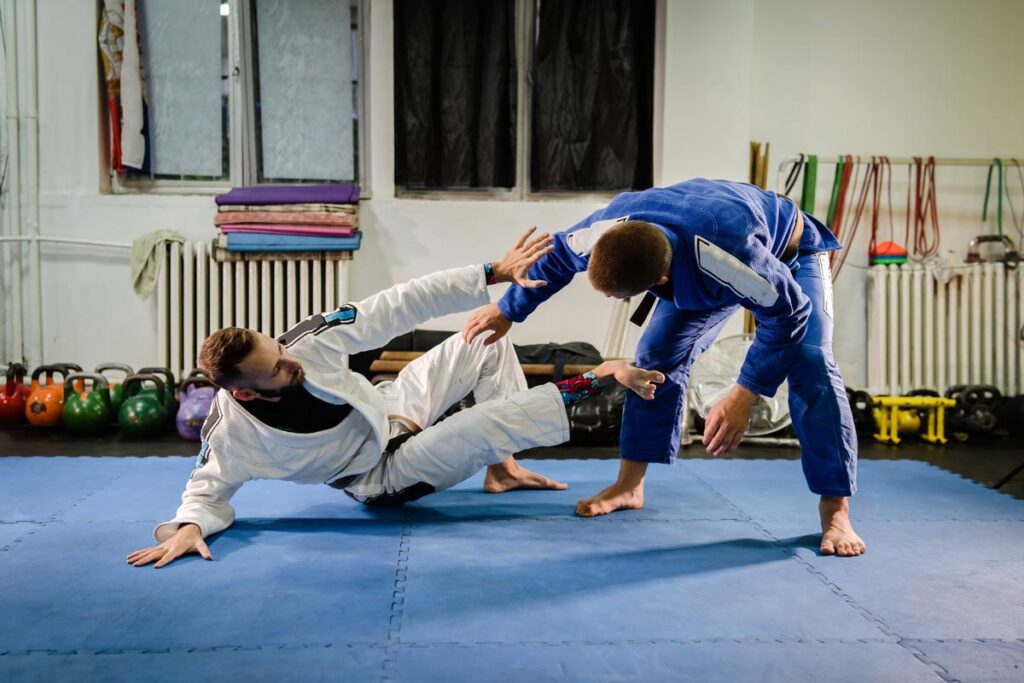
When it comes to jiu-jitsu, dehydration is straight up dangerous. It tanks your performance and can cause serious health issues. Here’s how to spot the warning signs early and avoid disaster.
Excessive Thirst
This one seems obvious – if your throat is dry and scratchy as the Sahara, you need H2O asap. But don’t wait until you feel excessively thirsty since you’re already dehydrated at that point.
Try to stay ahead of your thirst by sipping consistently throughout training. The moment you sense dry mouth coming on, pound water before you get parched. Pay attention to this early signal.
Headaches
Dehydration headaches feel like a massive vice grip on your skull.
The lack of fluid causes your brain to literally shrink and pull on your meninges membranes. Not awesome when you’re trying to dial in complex techniques.
At the first sign of a hydration headache, sip electrolytes and water. Massage your temples and neck too. Don’t tough it out – a bad headache can indicate serious dehydration issues.
Muscle Cramps
When your muscle fibers contract super hard but don’t quickly relax, you get the mother of all leg cramps. Dehydration depletes the electrolytes that regulate muscle function and leads to painful cramping.
Stretch the cramped muscle gently and drink electrolytes like coconut water. Eat a banana for potassium too. Hydrate immediately so cramps don’t take you off the mats.
Dizziness
Getting the spins during training is not cool. Dehydration reduces overall blood volume. Less blood to the brain causes you to feel light-headed and dizzy.
At the first sign of dizziness, hydrate and cut back your intensity. Let the instructor know if it gets worse – passing out from dehydration is serious danger.
Dark Urine
As mentioned earlier, you want your pee to be pale yellow, the color of light lemonade. Dark apple juice colored urine means you need way more fluids immediately.
Note the color before and after training. Consistently dark urine is a huge red flag to get on the hydration game fast.
Fatigue
Dehydration zaps your energy big time. You may feel too gassed to roll or lift weights when normally you’d crush it. Pay attention here – unusual fatigue can signal poor hydration.
Drink up, replenish electrolytes, and monitor your energy. If it doesn’t improve soon, dehydration could be taking you out of the game.
The moment you notice any of these warning signs, start hydrating immediately. Catching it early prevents major performance issues and dangerous health complications. Tune in to your body, hydrate smart, and train hard. Oss!
Wrapping up on “How much water should I drink BJJ?”
Calculate Your Sweat Rate
Figuring out your personal sweat rate in oz per hour is the first step. Weigh yourself before and after training while tracking fluids consumed. This dialed-in metric helps determine how much you need to drink.
Aim for 20-40 oz per hour as a general guideline. Monitor it over time as your rate can vary daily based on intensity, climate, and other factors. Don’t just rely on thirst as it lags behind your actual hydration needs.
Load Up on Fluids Pre-Training
In the 24 hours before a tough training session, increase your fluid intake to fully load up your reserves. Consume at least 2-3 extra cups of water on top of your usual daily amount.
Stick to water and coconut water. Avoid coffee, alcohol and sugary drinks that will dehydrate you. Check your urine – you want it light yellow. Dark yellow means pound more fluids immediately.
Set Hydration Targets During Training
Sip 4-6 oz of water every 15 minutes during training. Pour water over your head between rounds to cool your core temperature. Consume 16-24 oz per hour based on your size, sweat rate, and conditions.
If you feel dizzy, headachy or extremely thirsty, hydrate immediately. Don’t allow dehydration to set in. Weigh yourself post-training to monitor if you’re drinking enough to match sweat loss.
Replenish Electrolytes After Training
Post-training, electrolyte drinks and salty snacks replenish sodium and potassium lost through sweat. Avoid pounding gallons of plain water which can dangerously dilute sodium levels.
Keep sipping water in the hours after training to fully rehydrate. Your urine should return to pale yellow. Consistently dark urine means you need more fluids.
Watch Out for Dehydration Signs
Stay vigilant for excessive thirst, headaches, cramps, dizziness and dark urine. Catching dehydration early prevents performance declines and serious health complications.
Tune Into Your Body’s Needs
There’s no universal hydration approach that suits everyone. Pay attention to your individual cues and adjust your fluid intake over time. Optimizing hydration takes discipline, but the performance gains are massive.
Crushing your hydration game takes work, but it pays off big time on the mats. You’ll recover faster, feel stronger, and perform at the highest level. Now get out there, put these tips into practice and start dominating! Oss!
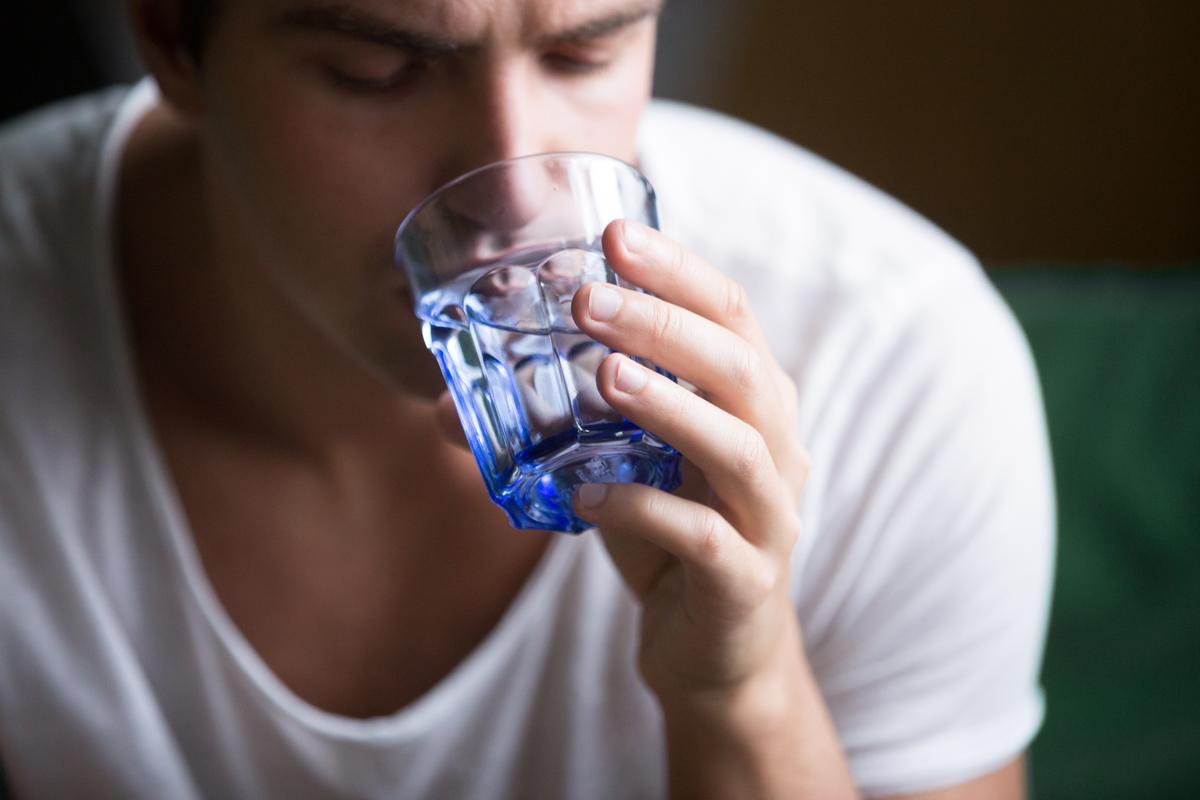
2 thoughts on “How much water should I drink during BJJ?”
Comments are closed.